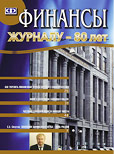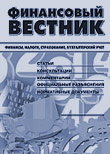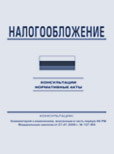Содержание
ФИНАНСЫ И БЮДЖЕТ: ПРОБЛЕМЫ И РЕШЕНИЯ
Е.В. Лебединская, директор Департамента доходов Минфина России
E-mail: finance-journal@mail.ru
Начиная с 2021 г. проводится поэтапная модернизация системы управления бюджетными доходами, в рамках которой осуществляется донастройка с учетом развития цифровых технологий системы администрирования, прогнозирования и анализа исполнения бюджетов бюджетной системы в части доходов, созданной в предшествующий период. В статье отражено, как осуществляется создание новой модели управления доходами на базе Перечня источников доходов Российской Федерации в государственной интегрированной информационной системе управления общественными финансами «Электронный бюджет».
Ключевые слова: система управления бюджетными доходами, цифровая трансформация, источники доходов бюджетов, главные администраторы доходов, дебиторская задолженность.
Н.А. Истомина, профессор кафедры финансов, денежного обращения и кредита Уральского государственного экономического университета, доктор экономических наук, доцент
E-mail: n_istomina_usue@mail.ru
В современных условиях развития бюджетной системы РФ важное значение уделяется открытости бюджетных данных. На основании открытой информации формируется, в частности, бюджетный имидж регионов. Формирование бюджетного имиджа может осуществляться целенаправленно за счет усилий региональных институтов или самостоятельно гражданами путем интерпретации различной финансовой (бюджетной) информации о субъекте РФ. В статье раскрыты подходы к формированию бюджетного имиджа регионов в РФ, приведены примеры некорректной интерпретации открытых бюджетных данных, обоснована необходимость и значимость реализации различных направлений деятельности органов власти субъектов РФ (в первую очередь, финансового органа) по влиянию на бюджетный имидж региона.
Ключевые слова: субъект РФ, бюджетный имидж региона, открытость бюджетных данных.
А.А. Кузин, начальник отдела анализа рисков макроэкономической и финансовой стабильности Департамента бюджетной политики и стратегического планирования Министерства финансов Российской Федерации, советник государственной гражданской службы 1 класса, аспирант Финансового университета при Правительстве Российской Федерации
E-mail: finance-journal@mail.ru
Риск реализации условных бюджетных обязательств на фоне существующих в настоящее время негативных тенденций развития национальной экономики, вызванных беспрецедентным внешним санкционным давлением и геополитической неопределенностью, может привести к еще большому увеличению расходов федерального бюджета, что, безусловно, негативно отразится на его устойчивости.
Одним из инструментов минимизации последствий для бюджетной устойчивости в результате реализации условных бюджетных обязательств является Целевой гарантийный фонд.
Ключевые слова: условные бюджетные обязательства, оценка условных бюджетных обязательств, Целевой гарантийный фонд, бюджетная система Российской Федерации, бюджетная устойчивость.
КАЗНАЧЕЙСТВО: СТАНОВЛЕНИЕ И РАЗВИТИЕ
E-mail: finance-journal@mail.ru
В конце марта текущего года состоялась Коллегия УФК по г. Москве, на которой были подведены итоги работы Управления в 2022 г. В номере публикуется обзор выступлений участников Коллегии.
Ключевые слова: УФК по г. Москве, коллегия, итоги 2022 г.
ЮБИЛЕЙ
М.Д. Шехалевич, главный аналитик Ведомственной охраны Минфина России
E-mail: finance-journal@mail.ru
В апреле 2023 г. отмечает 100-летний юбилей с даты образования Ведомственная охрана Минфина России. В статье приводятся факты о создания данного ведомства, ее руководителях в разные годы, практических результатах деятельности и настоящем состоянии Ведомственной охраны Минфина России.
Ключевые слова: Ведомственная охрана Минфина России, юбилей, история ведомственной охраны, традиции.
НАЛОГИ: ТЕОРИЯ И ПРАКТИКА
И.А. Майбуров, заведующий кафедрой финансового и налогового менеджмента Уральского федерального университета имени первого Президента России Б.Н. Ельцина, заслуженный деятель науки РФ, доктор экономических наук, профессор (г. Екатеринбург)
E-mail: mayburov.home@gmail.com
Д.Е. Лапов, преподаватель кафедры информационных технологий транспорта Сибирского государственного университета путей сообщения (г. Новосибирск)
E-mail: lapvd@rambler.ru
В статье рассмотрены результаты введения в России в 2021 г. двухуровневой шкалы ставок налога на доходы физических лиц. Полученные за непродолжительный период использования этой шкалы статистические данные позволяют сделать вывод о том, что введение прогрессии в ставках налога не вызвало снижения уровня налоговой мобилизации, наоборот, поступления налога увеличились из-за повышения совокупного налогового бремени физических лиц. Более 12% совокупной налоговой базы облагается по маргинальной налоговой ставке 15%, что создает значительные резервы для перераспределения таких доходов. Расчеты показывают, что в итоге по эффективной налоговой ставке в 14% облагаются доходы, превышающие 10 млн руб., и только при доходах более 100 млн руб. эффективная налоговая ставка приближается к недостижимому на практике 15-ти процентному уровню. Учитывая низкую величину прогрессии шкалы налога на доходы физических лиц, можно сказать, что введение в России прогрессивного налогообложения оказалось в большей степени формальным.
Ключевые слова: подоходный налог, прогрессивная шкала, шедулярный подход, налоговые ставки.
А.А. Пугачев, доцент кафедры финансов и кредита, научный сотрудник Управления научных исследований и инновация Ярославского государственного университета им. П.Г. Демидова, кандидат экономических наук, доцент
E-mail: andrxim@yandex.ru
Налоговые вычеты по НДФЛ – это один из государственных финансовых инструментов сглаживания неравенства граждан и преодоления бедности. Среди налоговых вычетов ключевыми по объему являются вычеты в сумме расходов, связанных с получением дохода от операции с ценными бумагами, имущественные и профессиональные вычеты. Стандартный и социальный вычет являются незначительными и в сумме формируют менее 8% объема вычетов. Инвестиционные и имущественные вычеты востребованы гражданами с доходами выше среднего, которые имеют возможности вложений в недвижимость и инвестиций. В совокупности это приводит к негативному воздействию вычетов по НДФЛ на неравенство граждан и уровень бедности.
Ключевые слова: неравенство граждан, бедность, НДФЛ, налоговые вычеты, инвестиционные вычеты, имущественные вычеты, социальные вычеты, стандартные вычеты, профессиональные вычеты.
КОРПОРАТИВНЫЕ ФИНАНСЫ
А.Ю. Болотова, руководитель центра компетенций мониторинга и пост-анализа проектов ПАО «МегаФон»
E-mail: a12011986@yahoo.com
Быстрые технологические изменения и неопределенность будущего развития оказывают большое влияние на инвестиционные проекты на рынке телекоммуникаций. Когда внедряются новые инновационные проекты, первоначальные предположения могут оказаться неверными в будущем, что серьезно повлияет на отдачу. Поэтому чрезвычайно важно, чтобы проекты обеспечивали гибкость, позволяющую руководству реагировать на непредвиденные изменения.
Руководство компании должно, например, иметь возможность принять решение ускорить проект, замедлить его или даже полностью отказаться от него. Однако стандартный метод NPV, используемый для оценки инвестиционных проектов, не в состоянии охватить различные варианты неопределенности. Концепция реального опциона, заимствованная из финансовой экономики, была предложена в качестве решения и реализует эту неопределенность в стандартных расчетах. Однако теория реального опциона лишь постепенно получает признание в телекоммуникационной сфере.
В этой статье описаны основы теории реальных опционов и предоставлены практические методологии применения реальных опционов к реалистичным бизнес-кейсам телекоммуникационного бизнеса: характеристики этой отрасли делают ее очень подходящей для применения реальных опционов к инвестиционным проектам.
Ключевые слова: реальные опционы; рынок телекоммуникаций, оценка бизнеса, инвестиционные проекты, биномиальный метод; метод Монте-Карло, формула Блэка – Шоулза, управленческая гибкость, неопределенность, стратегия компании.
МНЕНИЯ
Ю.А. Левин, профессор кафедры экономики и финансов Московского государственного института международных отношений (университета) Министерства иностранных дел Российской Федерации, доктор экономических наук, профессор
E-mail: levin25@mail.ru
Ю.В. Ларионова, профессор кафедры экономики и управления в строительстве Национального исследовательского Московского государственного строительного университета, доктор экономических наук, доцент
E-mail: KafedraEUS@mgsu.ru
Целью исследования является анализ финансовых условий и рисков концессионного механизма на примере проекта модернизации и развития систем водоснабжения в городском округе. Выполнен расчет финансовых показателей. Определены ожидаемые доходы концессионера от реализации проекта. Указано, что на реализацию проектов государственно-частного партнерства по комплексному решению проблем износа инженерных сетей влияет ряд труднопредсказуемых значений долгосрочных параметров концессионного соглашения, повышающих риски исполнения обязательств частным партнером. Делается вывод о путях минимизации рисков тарифного регулирования и сохранения необходимой для реализации концессионного договора доходной базы частного партнера.
Ключевые слова: государственно-частное партнерство, концессионный механизм, инвестиционная привлекательность, тарифы.
ФИНАНСЫ ЗАРУБЕЖНЫХ СТРАН
И.А. Балюк, профессор Департамента мировых финансов Финансового университета при Правительстве Российской Федерации, доктор экономических наук, доцент
E-mail: balyuk@bk.ru
М.А. Балюк, независимый эксперт, кандидат экономических наук
E-mail: balyuk@bk.ru
В статье раскрывается роль внешнего долга в дестабилизации мировой финансовой системы. Сделан вывод о том, что модель долгового финансирования в качестве концептуальной основы экономического развития является одним из важных факторов нестабильности мировой финансовой системы. Основной вклад в разбалансированность мировой экономики и мировых финансов вносят развитые страны, обладающие существенными преимуществами по сравнению с развивающимися странами в использовании источников внешнего финансирования.
В ближайшей перспективе вряд ли можно надеяться на заметное смягчение проблемы глобальной внешней задолженности, несмотря на продолжающиеся попытки международных финансовых институтов и национальных регуляторов сдерживать рост заимствований.
Ключевые слова: внешний долг, мировая финансовая система, модель долгового финансирования, индикаторы внешнедолговой устойчивости, суверенный дефолт, дисбаланс внешнего финансирования, нетто-кредиторы и нетто-заемщики, рост долгового бремени.
Content
FINANCE AND BUDGET: PROBLEMS AND SOLUTIONS
E.V. Lebedinskaya, director of the revenue department of the Ministry of finance of Russia
E-mail: finance-journal@mail.ru
Starting from 2021, a phased modernization of the budget revenue management system is being carried out, within the framework of which adjustment is carried out taking into account the development of digital technologies of the administration system, forecasting and analysis of the budget execution of the budget system in terms of revenues created in the previous period. The article reflects how a new revenue management model is being created on the basis of the List of Income Sources of the Russian Federation in the state integrated information system for public finance management "Electronic Budget."
Keywords: budget revenue management system, digital transformation, budget revenue sources, chief revenue administrators, receivables.
N.A. Istomina, professor, Department of finance, money circulation and credit, Ural state university of economics, doctor of economics, associate professor
E-mail: n_istomina_usue@mail.ru
In modern conditions for the development of the budget system of the Russian Federation, an important importance is paid to the openness of budget data. Based on open information, in particular, the budgetary image of the regions is formed. The formation of a budgetary image can be carried out purposefully at the expense of the efforts of regional institutions or independently by citizens by interpreting various financial (budgetary) information about the subject of the Russian Federation. The article discloses approaches to the formation of the budgetary image of regions in the Russian Federation, provides examples of incorrect interpretation of open budget data, justifies the need and significance of the implementation of various areas of activity of the authorities of the constituent entities of the Russian Federation (primarily the financial authority) to influence the budgetary image of the region.
Keywords: subject of the Russian Federation, budget image of the region, openness of budget data.
A.A. Kuzin, head of the risk analysis department of macroeconomic and financial stability of the Department of budget policy and strategic planning of the Ministry of finance of the Russian Federation, advisor to the state civil service of the 1st class, graduate student of the Financial university under the Government of the Russian Federation
E-mail: finance-journal@mail.ru
The risk of realization of conditional budgetary obligations against the background of the currently existing negative trends in the development of the national economy, caused by unprecedented external sanctions pressure and geopolitical uncertainty, can lead to an even greater increase in federal budget expenditures, which, of course, will negatively affect its stability.
One of the tools for minimizing the consequences for budgetary sustainability as a result of the implementation of contingent budgetary obligations is the Trust Guarantee Fund.
Keywords: conditional budget liabilities, assessment of conditional budget liabilities, Target Guarantee Fund, budget system of the Russian Federation, budget stability.
TREASURY: FORMATION AND DEVELOPMENT
E-mail: finance-journal@mail.ru
At the end of March of this year, the of the Moscow division of Federal treasury was held, at which the results of the work of the Department in 2022 were summed up. The issue publishes a review of the speeches of the members of the Board.
Keywords: FTD in Moscow, collegium, results of 2022.
ANNIVERSARY
M.D. Shekhalevich, сhief analyst of the Departmental security of the Ministry of finance of Russia
E-mail: finance-journal@mail.ru
In April 2023, it celebrates its 100th anniversary from the date of formation of the Departmental security of the Ministry of Finance of Russia. The article provides facts about the creation of this department, its leaders in different years, practical results of activities and the present state of the Departmental security of the Ministry of Finance of Russia.
Keywords: Departmental security of the Ministry of Finance of Russia, anniversary, history of departmental security, traditions.
TAXES: THEORY AND PRACTICE
I.A. Mayburov, head of the Department of financial and tax management of the Ural federal university named after the first President of Russia B.N. Yeltsin, honored scientist of the Russian Federation, doctor of economics, professor (Yekaterinburg)
E-mail: mayburov.home@gmail.com
D.E. Lapov, lecturer, Department of transport information technologies, Siberian state university of railways (Novosibirsk)
E-mail: lapvd@rambler.ru
The article considers the results of the introduction in Russia in 2021 of a two-level scale of personal income tax rates. The statistics obtained over a short period of use of this scale allow us to conclude that the introduction of a progression in tax rates did not cause a decrease in the level of tax mobilization, on the contrary, tax revenues increased due to an increase in the total tax burden of individuals. More than 12% of the total tax base is taxed at a marginal tax rate of 15%, which creates significant reserves for the redistribution of such income. Calculations show that as a result, income exceeding 10 million rubles is taxed at an effective tax rate of 14%, and only with income of more than 100 million rubles. the effective tax rate is approaching the 15 percent level unattainable in practice. Given the low progression of the personal income tax scale, we can say that the introduction of progressive taxation in Russia turned out to be more formal.
Keywords: income tax, progressive scale, shedular approach, tax rates.
A.A. Pugachev, associate professor, Department of finance and credit, researcher, Office of scientific research and innovation, Yaroslavl state university named after P.G. Demidova, candidate of economic sciences, associate professor
E-mail: andrxim@yandex.ru
Personal income tax deductions are one of the state financial instruments for smoothing the citizens inequality and overcoming poverty. Among the tax deductions, the key ones in terms of volume are deductions in the amount of expenses related to income from securities transactions, property and professional deductions. The standard and social deduction are insignificant and in total form less than 8% of the amount of deductions. Investment and property deductions are in demand by citizens with incomes above average, who have the opportunity to invest in real estate and investments. Together, this leads to a negative impact of personal income tax deductions on the inequality of citizens and the level of poverty.
Keywords: citizens inequality, poverty, personal income tax, tax deductions, investment deductions, property deductions, social deductions, standard deductions, professional deductions.
CORPORATE FINANCES
A.Yu. Bolotova, head of the Competence center for monitoring and post-analysis of projects of MegaFon PJSC
E-mail: a12011986@yahoo.com
Rapid technological changes and uncertainty of future development have a big impact on investment projects in the telecommunications market. When new innovative projects are introduced, initial assumptions may not be correct in the future, which will seriously affect the return. It is therefore extremely important that projects provide flexibility to enable management to respond to unforeseen changes.
The management of the company should, for example, be able to make a decision to speed up the project, slow it down or even completely abandon it. However, the standard NPV method used to evaluate investment projects fails to cover various uncertainty options. The real option concept, borrowed from the financial economy, has been proposed as a solution and implements this uncertainty in standard calculations. However, real option theory is only gradually gaining acceptance in the telecommunications field.
This article describes the basics of real options theory and provides practical methodologies for applying real options to realistic business cases of the telecommunications business: the characteristics of this industry make it very suitable for applying real options to investment projects.
Keywords: real options; telecommunications market, business valuation, investment projects, binomial method; Monte Carlo method, Black-Scholes formula, management flexibility, uncertainty, company strategy.
OPINIONS
Yu.A. Levin, professor, Department of economics and finance, Moscow state institute of international relations (university), Ministry of foreign affairs of the Russian Federation, doctor of economics, professor
E-mail: levin25@mail.ru
Yu.V. Larionova, professor, Department of economics and management in construction, National research Moscow state university of construction, doctor of economics, associate professor
E-mail: KafedraEUS@mgsu.ru
The purpose of the study is to analyze the financial conditions and risks of the concession mechanism using the example of a project for the modernization and development of water supply systems in the urban district. Financial key figures have been calculated. The expected revenues of the concessionaire from the implementation of the project have been determined. It is indicated that the implementation of public-private partnership projects to comprehensively solve the problems of wear and tear of engineering networks is influenced by a number of difficult-to-predict values of long-term parameters of the concession agreement, which increase the risks of fulfilling obligations by a private partner. It is concluded that ways to minimize the risks of tariff regulation and maintain the revenue base of the private partner necessary for the implementation of the concession agreement.
Keywords: public-private partnership, concession mechanism, investments, investment attraction, tariffs.
FOREIGN FINANCE
I.A. Balyuk, professor, Department of world finance, Financial university under the Government of the Russian Federation, doctor of economics, associate professor
E-mail: balyuk@bk.ru
M.A. Balyuk, independent expert, candidate of economic sciences
E-mail: balyuk@bk.ru
The paper reveals the role of external debt in destabilizing the global financial system. The conclusion is made that the model of debt finance as a conceptual basis for economic development is one of the important factors of the global financial system’s instability. The main contribution to the imbalance of world economy and world finance is made by developed countries, which have significant advantages over developing countries in using sources of external financing. In the short term, it is unlikely to see a significant easing of the global external debt problem, despite the ongoing attempts by international financial institutions and national regulators to restrain the growth of external borrowings.
Keywords: external debt, global financial system, model of debt finance, indicators of debt sustainability, sovereign default, imbalance of external financing, net lenders and net borrowers, debt burden growth.













